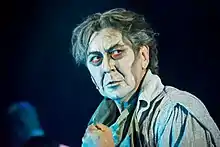Albert Asadullin
Albert Nurullovich Asadullin (Tatar: Альберт Нурулла улы Әсәдуллин, Russian: Альберт Нуруллович Асадуллин; born September 1, 1948, Kazan) is a Soviet and Russian Tatar[1] singer,[2] tenor altino.[3] Honored Artist of the RSFSR (1988), People's Artist of Tatarstan (1998).[4][5]
Albert Asadullin | |
|---|---|
 | |
| Background information | |
| Birth name | Albert Nurullovich Asadullin |
| Born | September 1, 1948 Kazan, Tatar Autonomous Soviet Socialist Republic, RSFSR, USSR |
| Occupation(s) | Singer |
| Years active | 1975 — present |
Biography
He was born in Kazan in the family of an officer in retirement, a participant in the Great Patriotic War and a simple housewife. In addition to Albert, there were two older sisters in the family. One for seven years, and the other for nine years.
He studied at the Kazan Art College, then graduated from the Academy of Arts, receiving a diploma of an architect. It was in the Academy that he started singing in the amateur ensemble Ghosts. Albert Asadullin:
- It was an atmosphere all over the world: new bands, The Beatles, hippie festivals, Woodstock... The air of freedom, movement around the world. The desire to do something, to declare myself. Then we had the will of the soul and heart, the desire to simply engage in creativity.[1]
In 1975 he decided to sing professionally. Then he received from VIA Poyushchiye Gitary an invitation to the main role in the first Soviet rock opera Orpheus and Eurydice (music by Alexander Zhurbin). His partner on the stage was Irina Ponarovskaya. Then, for five years, Asadullin with success toured in the Poyushchiye Gitary for the Soviet Union.
In 1979, Asadullin was awarded the title of laureate of the second prize at the International Competition Golden Orpheus.
In 2008 he voiced the main character of Ilya Maximov's animated film Little Longnose.
Currently Albert Asadullin is a soloist of the State Concert and Philharmonic Institute Petersburg-Concert and professor of the Solo Singing Department of the Institute of Music, Theater and Choreography of the Herzen University.
References
- Альберт Асадуллин: «Когда я понял, что Суконной слободы не стало, испытал чувство потери» Archived October 14, 2017, at the Wayback Machine Бизнес Online
- "Рок-опера "Орфей и Эвридика": информация и фото". Archived from the original on April 20, 2010. Retrieved October 13, 2017.
- Альберт Асадуллин: В школе была двойка по пению
- "Biography". Archived from the original on March 7, 2016. Retrieved October 25, 2015.
- Альберт Асадуллин: «Я ненавижу тусовки» (интервью певца газете «Молодёжь Татарстана»)
External links
- Official website
- Альберт Асадуллин на сайте проекта KM.ru Archived April 22, 2005, at the Wayback Machine
- Music of Albert Asadullin